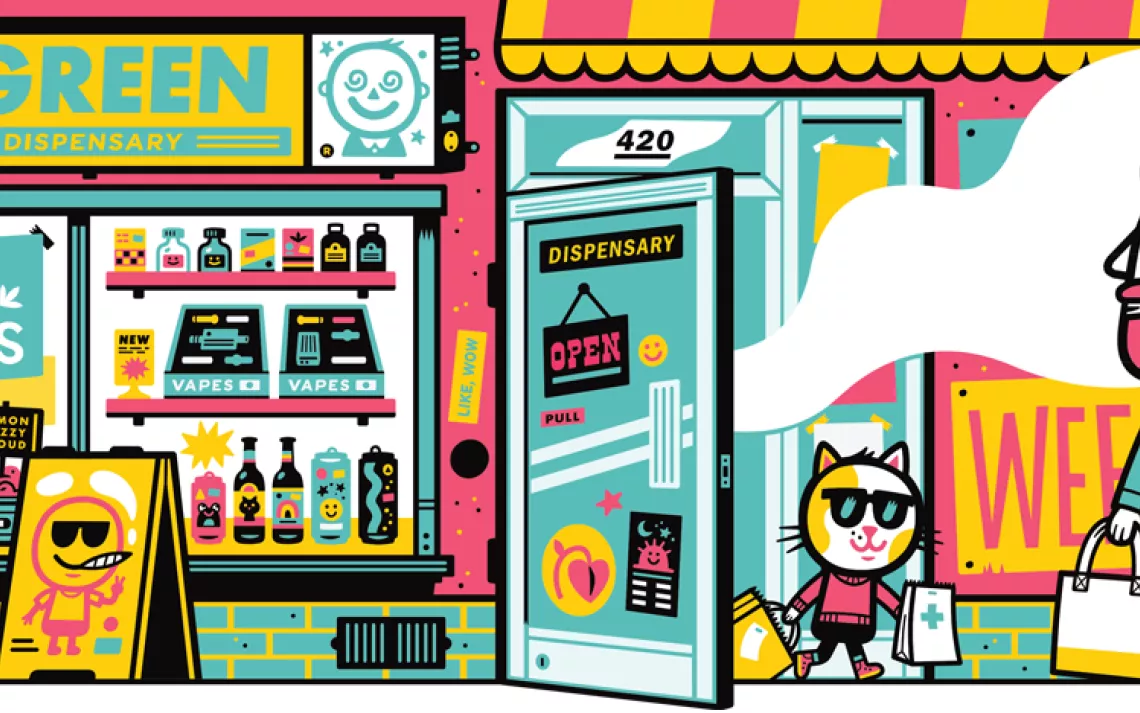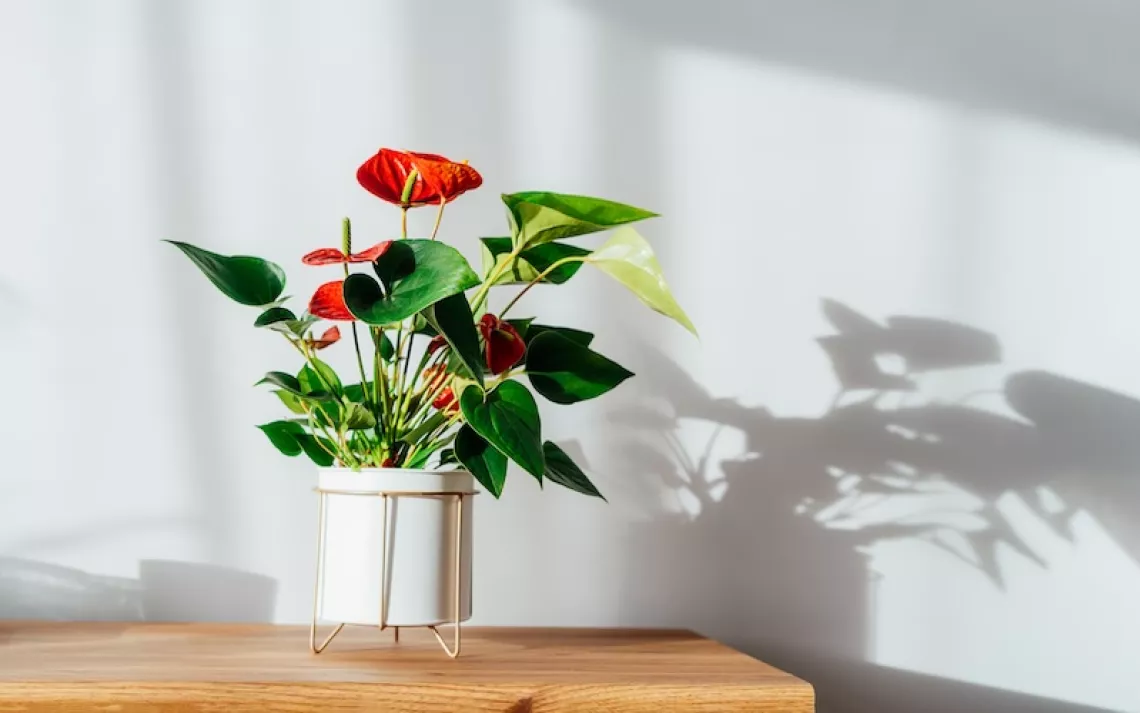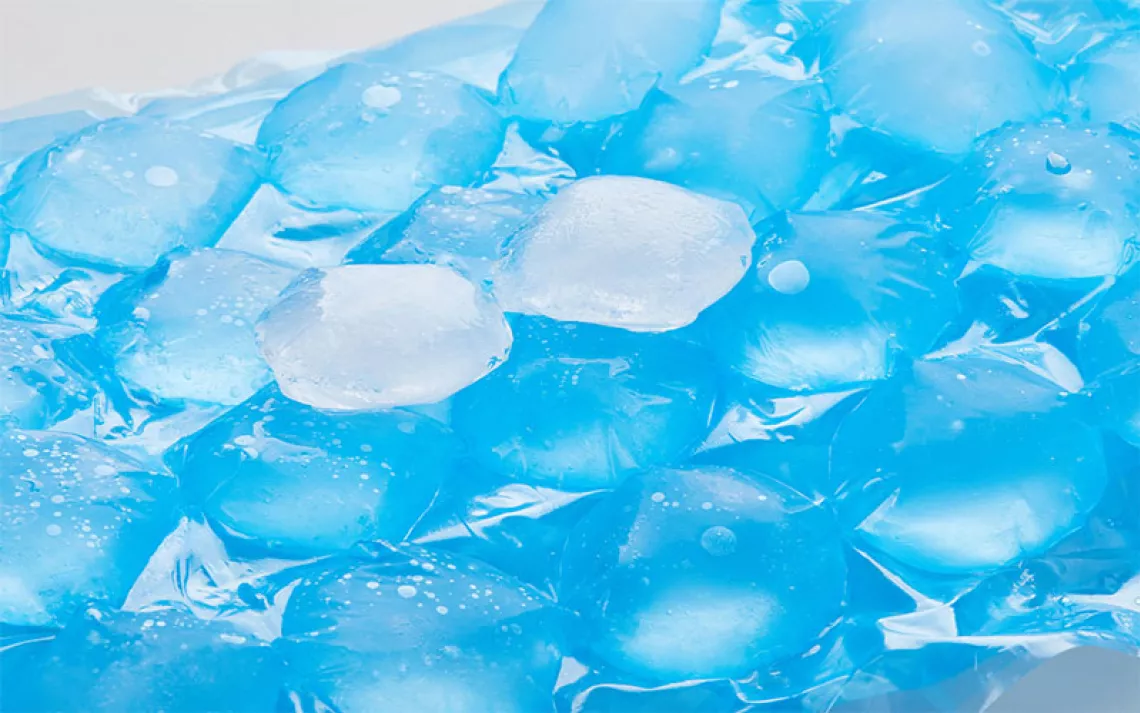Higher Ground: Best Practices for Safe and Sustainable Cannabis Consumption
As more ways to lawfully imbibe become available, the choices can be confusing
Illustration by Little Friends of Printmaking

Prohibition is almost over. The majority of Americans now live in states where they can legally consume medicinal or recreational cannabis. As more ways to lawfully partake become available, the choices can be confusing. Neither the FDA nor the USDA offers clear cannabis guidelines, so consumers are at the mercy of individual suppliers and licensing agencies. The industry is in many ways opaque and in flux, but here are some best practices for consuming safely and sustainably.
Buy Organic-ish
Since cannabis remains federally illegal, organic certification isn't available, even for licensed producers. Look for Clean Green or Sun+Earth certification on cannabis product packaging—the industry's equivalent to an organic label. The Clean Green Certified program was created in 2004 to help farms and producers obtain certification according to the USDA National Organic Program standards. In 2018, a group of Northern California farms, growers, and activists devised the Sun+Earth Certified program, which claims to go "beyond organic" by requiring regenerative farming techniques for certification.
Purchase Outdoor-Grown
Indoor cannabis cultivation has an exceptionally high carbon footprint, and its energy consumption accounts for 1 percent of national electricity use, according to some studies. On average, the production of one kilogram of indoor-grown cannabis results in 4,600 kilograms of carbon dioxide emissions, the equivalent of driving the United States from coast to coast 11 times. Outdoor cannabis production sometimes requires electricity, but it's significantly less than what indoor operations use. Ask budtenders for sun-grown flowers.
Know Your Producer
The illicit cannabis market remains a major player across the country, even in states that have legalized growing and consumption. Illegal grow operations, which aren't subject to any kind of formal environmental regulation, often rely heavily on synthetic pesticides, which in turn jeopardizes nearby water supplies and wildlife. And since such operations often trespass on public lands, they frequently poison and degrade wild areas. Buying legally not only reduces demand for "dirty" weed but also helps to lower energy usage. In early-legalization states like Colorado and Washington, for instance, legal producers are encouraged to enroll in energy-saving programs.
Buy Products With COAs
Make sure all cannabis purchases bear a Certificate of Analysis or include testing results. (Easy if you live in a legal state, as testing is required for dispensary sales.) COAs mean products have cleared third-party screenings for heavy metals, mold, and other harmful agents that are generally impossible to avoid when buying unlicensed products.
Seek Out Low-Waste Packaging
Because of a multitude of regulations that vary from state to state but most often involve childproofing, packaging waste has become a major environmental hurdle for the cannabis industry. Certain companies, like Ocean Cannabis Co. in California, are finding solutions in harvesting ocean plastic. Also keep an eye out for hemp plastics, glass, and paper packaging.
This article appeared in the January/February edition with the headline "Higher Ground."
Pro Tips by Product
Cannabis Flowers
Unprocessed, sun-grown cannabis flowers have smaller eco-footprints than highly processed oils. Buy flowers in jars (rather than single pre-rolls) to reduce throwaway packaging.
Edibles
Edibles used to be the wild card of cannabis consumption, but thanks to legalization, it's now easy to research what they're made from online and seek out organic ingredients and vegan bona fides.
Rolling Papers
Alternatives to traditional rolling papers include hemp and rice papers, but a glass pipe is inherently earth-friendlier, as it cuts down on waste and production.
Vapes
Much controversy surrounds vape cartridges, and rightly so. To ensure quality, buy from a reputable dispensary—this guarantees that products have met testing and safety standards, which include restrictions on additives. Some brands (like Curaleaf) and dispensaries offer recycling programs for used cartridges. This is the only way to recycle a vape cart, so take advantage!
Cannabidiol
Cannabidiol, more popularly known as CBD, is mainly derived from the hemp plant and constitutes an entirely separate industry from cannabis, at least where intoxication and regulation are concerned. To safely and sustainably consume CBD, buy USA-sourced hemp—regulations and transparency are much easier to assess that way. While organic designation is possible for CBD products, it is difficult to achieve, so make sure CBD companies are forthright about their sourcing. Are they naming their farm(s)? Are other ingredients in a product, like base oils or herbal additives, clearly labeled?
 The Magazine of The Sierra Club
The Magazine of The Sierra Club



